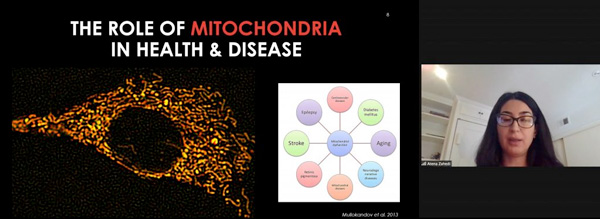Feb. 22, 2021

Atena Zahedi, UC President’s postdoctoral fellow from the UCI Sue & Bill Gross Stem Cell Research Center, was the featured speaker at the recent “This Is What a Scientist/Engineer Looks Like” program
Atena Zahedi, UC President’s postdoctoral fellow from the UCI Sue & Bill Gross Stem Cell Research Center, was the featured speaker at the recent “This Is What a Scientist/Engineer Looks Like” program. The virtual event, held Friday, Feb. 19, offered participant information from UCI advocates across the campus about best strategies to support funding, mentoring, and thriving in their STEMM (science, technology, engineering, mathematics and medicine) career pursuits.
Zahedi presented an overview of her current work which is focused on taking human neural stem cell lines, used for transplantation, and treating them with various different mitochondria drugs. Her previous work, with a team of researchers, found that electronic cigarettes – often targeted to youth and pregnant women – produced a stress response in neural stem cells that threatened brain function.
“I’ve always been fortunate enough to be guided by amazing mentors,” Zahedi said. “I would recommend to not be afraid and approach people and to talk to them. Mentors are providing their time and their expertise. We have to be able to take advantage of it and not be afraid to just talk and ask for help,” she advises.
G.P. Li, director of CALIT2 invited STEMM students to connect with the resources at CALIT2. “There are many research development opportunities and outreach activities within CALIT2. If you are interested, please reach out to me and I will try my best to make a connection for you,” he says.
Program panelists included Sharnnia Artis, Assistant Dean, Office of Access and Inclusion (OAI); Pheather Harris, Director of CA Alliance for Minority Participation; Kayleigh Anderson-Natale, Postdoctoral and Professional Development, Graduate Division; Grego Diggs Yang, Assistant Director, OAI; and Douglas M. Haynes, Vice Chancellor for Equity, Diversity and Inclusion.
The advocates shared several tips with students. Yang reminded participants of resources available through OAI, such as tutoring, workshops, mentoring programs, and scholarships, research and employment opportunities. “I want people to know at the OAI we are a one-stop shop for a lot of different things,” he says
Anderson recommended that students have a research mentor and a professional development mentor. These aren’t typically the same person, she said.
The California Alliance for Minority Participation provides targeted intervention strategies and support systems for students. “Most of our programming is focused on the first and second year of the undergrad experience,” Harris says. “If we can get them to their junior year, they have an 80 percent chance of persisting. We have courses, workshops and classes all along the way to bolster that experience.”
Doug Haynes, vice chancellor for equity, diversity and inclusion, noted UCI’s Black Thriving Initiative – a campus-wide commitment to remove every obstacle to Black people’s success. The endeavor builds on UCI’s long legacy of combating racism through various opportunities, programs and grants. “Your resilience is something that is extremely important. Always remember that you’re changing UCI by being here, you’re making us better and so let us help you with your goals and aspirations,” Haynes said.
This program was part of a series focused on supporting success among students and faculty in science, technology, engineering, mathematics and medicine, sponsored by the UCI Office of Inclusive Excellence, UCI Samueli School of Engineering and Donald Bren School of Information & Computer Sciences Office of Access & Inclusion, and CALIT2.
– Sharon Henry
